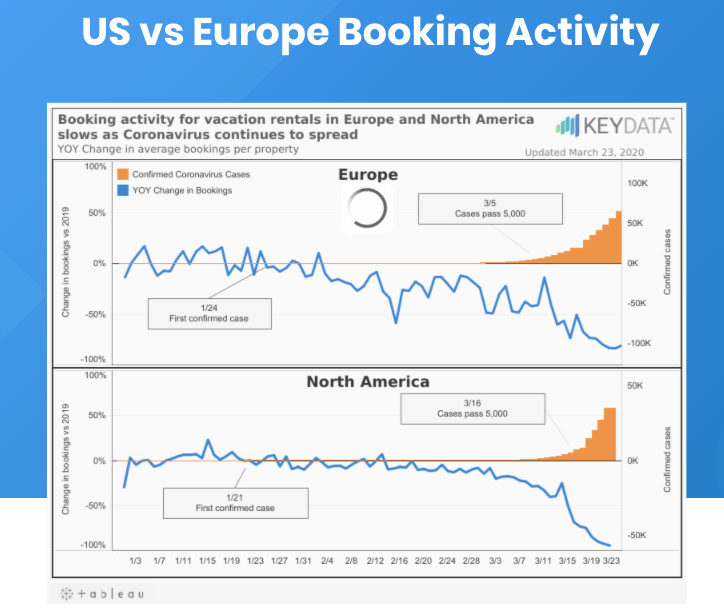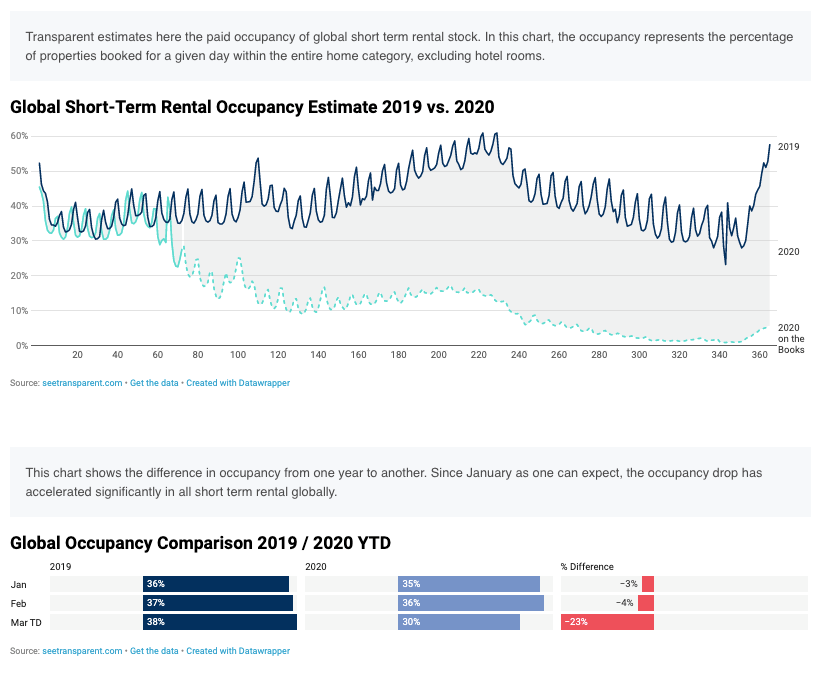COVID-19: Impact on Short-Term Rentals (Webcast Summary)

To support the multifamily community through the current COVID-19 crisis, we’ve launched a series of discussions centered around its impact on the rental housing industry with the latest data, expert insights and actionable measures stakeholders can take to minimize fallout.
This is a condensed summary from the webcast, COVID-19: Impact on Short-Term Rentals, broadcast on March 31, with RealPage VP and Deputy Chief Economist Jay Parsons, Kigo General Manager Daniel Bowen, with special guests industry veterans Alex Diaz, CEO of My Puerto Vallarta Rentals; Heather Bayer, Co-Founder of The Vacation Rental Formula; and Tom Powers, Owner of Folly Time Beach Rentals and Abodeca.
GLOBAL & NATIONAL SNAPSHOT: SHORT-TERM RENTAL TRENDS
Economic fallout from the health crisis has now extended into most areas of the global economy. More and more cities around the world are adopting shelter-in-place ordinances and banning guests from short-term rental properties with brutal impact.
According to industry tracker Key Data, bookings across North America and Europe almost completely cratered compared to the same time last year. Cancellations have escalated through March and April, and cancellation rates are above 2019 levels and expected to stretch into June.

Source: Key Data
Industry tracker Transparent shows that in February, global short-term rental occupancy rates in short-term rentals were comparable to 2019 levels everywhere (except China)—however the projection is that global occupancy will continue to freefall for the remainder of the calendar year.

Source: Transparent
Industry veterans we interviewed speculated that the fly-in market for the vacation rental industry may not fully recover for 12-18 months due to the economic fallout resulting from COVID-19. Others expect the earliest signs of recovery to appear around November.
Despite the hits that beach and ski communities are taking, the sector that has been dealt the hardest blow has been Urban Rentals, given their proximity to densely populated city centers. With rampant cancellations across metros, suggested measures to offset these losses have included renegotiating lease contracts, implementing Force Majeure clauses and even walking away from the properties altogether—providing opportunities for other investors.
COVID-19 has also accelerated some short-term rentals and owners’ thoughts about repositioning for longer-term rentals. Other predicted outcomes from the pandemic include a shift in traveler behavior that will diminish the week-long market and see shortened stays with more frequent discounts.
According to Kigo General Manager Daniel Bowen, “With this accelerated convergence, expect to see increased demands overall from respective stakeholders: Multifamily owners will demand more revenue share, operators will demand more data transparency, and residents will demand a voice in how STR units are positioned where they live.”
A VIEW FROM INSIDE: HOW PROPERTY MANAGERS ARE TAKING ACTION
My Puerto Vallarta Rentals
Alex Diaz of My Puerto Vallarta Rentals (Mexico) shared that this is now his low season (as opposed to May), with 90% cancellations through March and April. With isolation mandates enforced by the Mexican government for another 30 days, certain aspects of the business have come to a complete halt, but Alex is taking both defensive and offensive actions that include intensive maintenance efforts and ardent communication.
“We follow a strict regimen for cleaning and disinfecting our properties and have stepped up those procedures. We also take it one step further and take videos and photos that we share with guests and owners to keep them informed and confident that we’re doing everything we can to protect guests and their properties.”
Vacation Rental Formula
Heather Bayer of Vacation Rental Formula (Canada) suspended all reservations until mid-May because “it would be irresponsible to bring people to our remote locations from the city.” The roller-coaster effect has seen daily business emails plummet from 150- 200 down to just two. The key. she says. is to keep thinking forward and use this time productively and optimistically to create a better business for the future.
“It’s a great time to spend on Google ads that are now cheaper and put together the campaign you can launch the moment the market begins to shift.”
Folly Time Beach Rentals
Tom Powers of Folly Time Beach Rentals (South Carolina) has experienced a rebooking rate of 50%, is still getting calls for May, and has not yet seen many summer cancellations. “When rebooking people, I’m finding that 15%-20% will choose a future reservation.” He emphasized that he is not spending any more money on marketing, but he has begun extending future discounts to guests and has taken his already high-standard sanitization practices from a level 10 to a level 15. A self-proclaimed “positivity distributor,” his advice for getting through this crisis is just as practical as it is positive:
“Get a grip on the future and assess what you stand to lose. Look at mortgage options and small business loans. Stay cool, calm and collected as the deck is being reshuffled.”
BEST PRACTICES FOR PRESERVING YOUR BUSINESS MODEL IN A DOWNTURN
Be Flexible with OTAs and Cancellation Policies
OTAs are an indispensable partner for vacation rental businesses, but some cancellation policies in response to COVID-19 have felt punitive to owners and operators. Flexibility is imperative. This is a time for hosts, guests and OTAs to provide answers that can be amenable to all parties involved, like offering partial refunds (e.g., HomeAway instituted a 50% refund policy many in the industry considered fair) and future credits.
Lean Even More on Technology
Now is an opportune time for STR operators to step back and lean more on high-quality technology providers like Kigo to help increase operational efficiencies, especially now that it is critical to be able to do more with less in order to survive. Explore using integrated platforms that provide comprehensive, all-in-one solutions that enable you to lean on them for marketing, revenue management and channel management.
Keep Creating Good Content
Use this time to create unique and rich content like substantive blog posts with credible links and keywords for better optimization. Take high-quality photos of units. Leverage your vast contact list and send engaging newsletters and drip email campaigns utilizing compelling photos that appeal to the target’s need to escape—even if it can only be virtually for now.
Alex shared how he “digitized” himself and utilizes YouTube, Facebook, Instagram and podcasts to reach the different segments of his audience. “Facebook is very cheap. You can start a page in minutes, and you can advertise on Craigslist for free.”
Maintain Communication
This is the time to stay in constant communication with owners and keep them informed—and assured that you’re committed to seeing their properties through the crisis. Every owner is different and so are their needs. Alex spends 10 minutes with every one of his owners on a weekly basis. Heather notes the importance of building relationships with guests, keeping them informed about changes you’re making and staying in contact to cultivate retention.
Research and Share Data
“Normally, I do a benchmarking study that I send to owners. This has been my best way to communicate with them.” Alex keeps his stakeholders informed about property performance and market trends, sharing data and insights from credible resources like Skift, AirDNA, Booking.com and Kigo that “help them trust me and get on board with my strategies.”
THE RISE OF THE DESTINATION OFFICE: A POSITIVE OUTLOOK
The good news is that bookings are happening now—for the drive-to market. Marketing efforts should be redirected to cater to domestic travelers. Stateside, we’ve seen an uptick in more retreat-feel destinations like Lake Tahoe. In the Dallas area, for example, more rural locations like Broken Bow, Oklahoma, are proving to be popular drive-to destinations.
We also foresee a future boon for the short-term rental industry. With work-from-home productivity rates equal to and oftentimes exceeding in-office efforts, expect a shift in company mandates about on-site work presence. Once “digital nomads” become the norm, with the freedom to work anywhere there’s a reliable Wi-Fi connection, they will be seeking “destination offices” in beautiful locations that provide a view or certain spirit of place they can’t get at home.